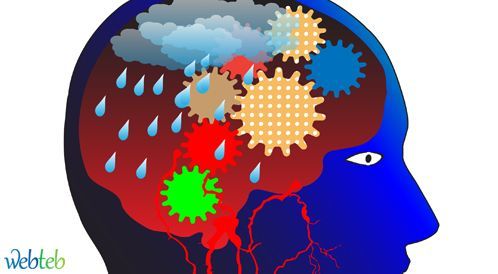Psychotic depression is a sub-type of depression, belongs to a group known as the moods, which include a number of disorders in which the symptoms of depression appear disorders group.
Psychotic depression involves a combination of clinical symptoms of major depression, with psychotic symptoms and affects 15% - 19% of those who suffer from depression principal. Also, this phenomenon occurs in very rare cases in postpartum depression (in 1% of cases).

Psychotic depression usually increases when symptoms of depression show a very steep level, especially in cases in which it arises risk of suicide, delusions or other concerns and cognitive impairment.
Psychotic depression - the characteristics of this disorder:
Psychotic depression include symptoms of clinical depression, such as sadness, Elias, indifference and lack of initiative. Besides, psychotic symptoms with a variable level of psychotic episodes appear. Psychotic symptoms that appear as part of a psychotic depression, is divided into two types. The first type includes psychotic symptoms match depressive traits. For example, the dumb (aphasia), severe self-neglect, and the types of illusion that match with a feeling of sadness and despair. For example, ideas about the voice of the person that he says is worthless. Type II, includes psychotic symptoms contradiction depressive symptoms. Thus, for example, a person may feel depressed, and he has at the same time a sense of greatness, feeling that he has extensive knowledge of excessive force.
Psychotic depression - Diagnosis and treatment:
Psychotic depression may pose a challenge to treat this as one of the main challenges is the diagnosis of this phenomenon, with all respect to the ability to distinguish between cases of psychotic depression and schizophrenia of all kinds. For example, when it comes to depression, which includes psychotic depressive symptoms, which corresponds to the psychotic symptoms, the clinical disease of schizophrenia are very similar picture. As well as, in many cases, be slightly psychotic symptoms or hidden. Proper diagnosis is extremely important, because it determines the treatment as well as the prospects for recovery. Another challenge is linked to the quality of treatment. The treatment of psychotic depression depends on the integration of anti-psychotic drugs with anti-depressant medications that are given within the consultation with a specialist psychiatric diseases. Sometimes, it is also the integration of electro-shock therapy (ECT) or any psychiatric treatment.
However, more than once it has been shown that the symptoms do not respond to treatment, and that in many cases temporary improvement followed by a worsening of the situation happens. Given the difficulty of diagnosis and treatment, with a risk of suicide, it is necessary in many cases, the introduction of the person to hospital for psychiatric treatment periods variable. Also, there are other situations that require rapid therapeutic intervention, especially psychotic depression cases that appear withinpostpartum depression . Treatment in these cases fateful not only because of concern for the mother, but for the quality of their relationship with the child and his safety.
Today, there are experts who claim that psychotic depression is not a sub-species of the main depression, but it is a separate disorder. The arguments are based on the prominent neurological differences between the two cases.On the other hand, some argue that there is a link between the two disorders, so that he found in the first party mood disorders cases, and in the other party psychiatric disorders.